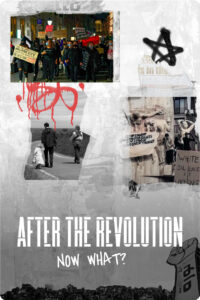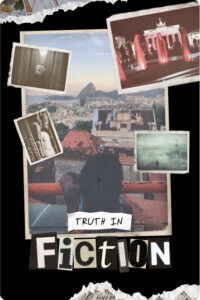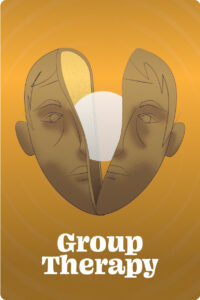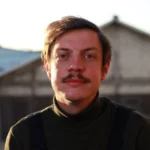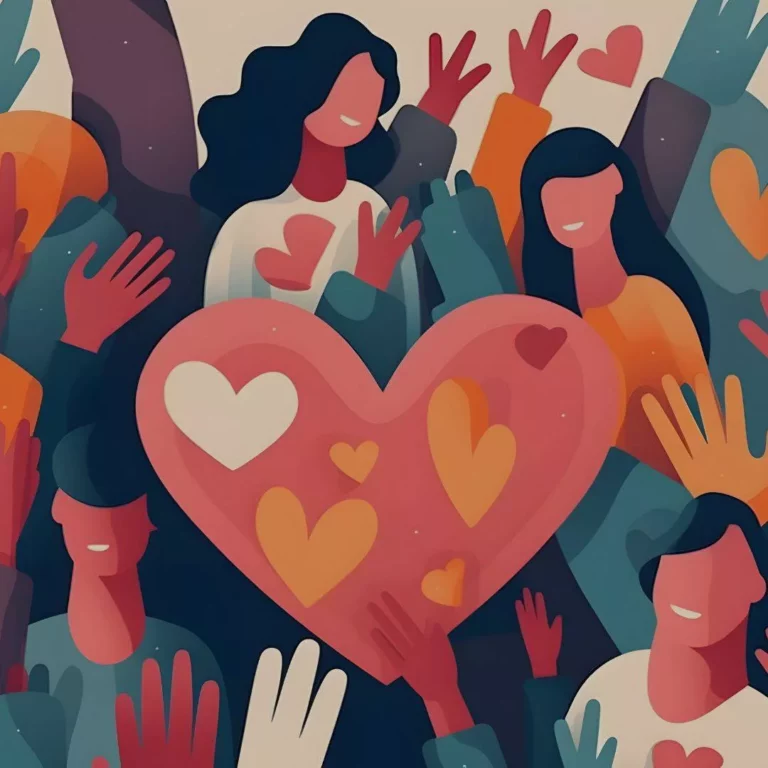
20/09/2023
Music : Klit Osiris
Help us tell the world to you !
Frictions is launching its crowdfunding campaign: by supporting Frictions, you’ll be supporting a community of authors and journalists who tell the world through intimate stories!
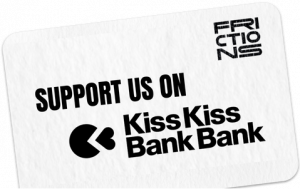
You will find below the transcript of the podcast translated into English. Translator: Victoria Smith.
It struck me one day that when we’re asked the classic question “How are you?”, most of the time we reply by talking about our partners, our family, our work or our health, maybe even the things that we’ve bought lately… but we rarely talk about our friendships. Not the exhilarating new ones, nor the painful fading ones, nor the enduring ones that carry us.
As a queer person, the notion of chosen family has always been central for me. I can say that friendship has enhanced, affirmed and even saved my life. But a few years ago, as I approached my thirties, a growing number of my friends began to become more focussed on their romantic relationships, children, professional careers or buying property… It reminded me of references in pop culture – whether it’s in Girls, Sex and the City or Friends, stories of friendships end when characters reach a new social status associated with adulthood, like spouse or parent… It seems that friendships can only become important again once these statuses have run their course, as in Golden Girls or Grace and Frankie. I couldn’t help but wonder: is friendship meant to only be a priority in our youth, before being replaced with something else?
During this time, I was spending a semester in London. There, I partied, wrote a novel, tried to learn how to play the piano, bought a camera, stopped trying to learn how to play the piano, met new people, but, above all, I spent a lot of time alone. I was happy, walking along the canal, but I missed my friends, too. And I worried that by leaving, I had perhaps taken too great a risk of cutting ties. I remember that I was walking between the rose bushes of Queen Mary’s Garden in Regent’s Park when I made the decision to restore the image of friendship. I decided on the following strategy: I would meet pairs of friends, interview them on their relationship, try to establish a sort of definition of friendship. Perhaps by inviting the world to acknowledge the value of friendship, people would be inspired to protect it. In any case, that was the official motivation behind the project, but I would quickly discover that there was something else going on underneath. I named the friendship rescue operation: Amour Vraiment [Love Truly]
***
I started with Aline and Ferdinand. At the time, I had just met them. They’ve been friends for a long time, and when I tell them about my project, they are immediately enthusiastic. Soon afterward, I meet up with Aline. As she settles at a table on the rooftop at Fox, a pub in East London, she is disarmingly unfazed by my questions and my phone set to record. As the sun goes down, she gets up regularly to ask for a lighter, drags on a cigarette, and tells me her story.
A week later, I interview Ferdinand in the pink and gold living room of my share flat. At the beginning he puts on, as he admits, a “little show”: he’s enthusiastic, he makes jokes, speaks loudly, quickly and copiously. And then, as we keep talking, his attitude shifts. What was just a game is now high stakes. He pauses, considers his words. I think that it’s beautiful, the effect it has, talking about people that we love.
Aline: So, the first time that I met Ferdinand, I didn’t actually meet him – it was the first time that I saw Ferdinand.
Aline describes the moment as though telling a story. She depicts herself as the dark ingenue: a recent arrival in Paris for her first year of art school, she is full of hope, but has the look of someone that won’t make the first move, but maybe wouldn’t mind if you approached her. Just before school starts, she heads to the BHV in the Marais to buy her school supplies, all the better to play at being the real Parisienne.
Aline: And I arrive at the BHV, and I’m picking up my bits and pieces, and I see a boy. A boy: leather jacket, super tall, blue eyes. And I think, “Wow, that guy is really hot”. And I say to myself, “There you go Aline – you’re in Paris, and everything that you’ve been looking for in Marseille since you were a teenager, it’s here, you’ll have it all, it’s here, you’re here.”
In Aline’s eyes, this stranger is an allegory – of nightlife, of culture, of beauty. She sees him again as she leaves the store, then he disappears into Paris.
Ferdinand tells me about the beginning of the school year, and that mysterious girl…
Ferdinand: So, the first time that I remember seeing her was in the stairwell at university. I think that it was the second day of term.
Aline: A huge figure arrives, sits behind me… and I think, I know this guy, I know this guy… and I turn around, and I say to myself, “It’s the guy from BHV”. And I say to myself “Incredible!”
Ferdinand: I went up to talk to her, I said “Cool bag! I love the The Velvet Underground. Where did you get it?” and she said, “I bought it in London …”
Aline: And I said to him, “And you’re wearing Creepers! I love London too, I’ve wanted to live there since forever, and I can’t find Creepers in Paris, I’ve looked everywhere”. And he said to me, “I bought them there too, in Soho, in London”. And from that moment, connection.
Aline and Ferdinand’s story made me think about coincidences. Sometimes, our paths cross with someone again and again, as if something wanted to make sure that we didn’t miss each other. But other times, our most important encounters are the result of an immense coincidence.
I’m thinking of one of my best friends, Sarah. Through being told and retold for fifteen years, the story of how I met her has become a kind of legend. The story of our meeting always gives me a mixed feelings – an impression of being simultaneously written in the stars, and immensely fragile; we could have missed each other. Alright, I’ll tell it then:
Once upon a time
a fourteen-year-old that was a big, big fan of a pop singer called ***** (I won’t reveal the name. I could say it’s for legal reasons but it’s mostly because I’m a bit embarrassed)
One day, he decided to google some of the lyrics of one of her songs.
Dis-moi que tout va bien, au creux de l’oreille…
que je puisse enfin, enfin trouver le sommeil…
That’s when he found a blog.
Here, someone always asks the question, so I’ll make it clear right away: no, it wasn’t a Skyblog.
The blog belonged to a girl his own age, who was also a big fan of *****.
He left her a comment.
They added each other on MSN Messenger…
And they became best friends.
Twelve years later, he was the best man at her wedding.
But before that, they had a lot to say to each other…
Aline: And from that moment, connection. And also, you know, Ferdinand is gay. So, he’s cute but honey… you’ve got something, but it’s going to be something else.
***
Next, I interview Fanny and Justine. With them, I am on ground that is more than familiar – they’ve been two of my best friends since high school. I ask them too many questions to which I already know the answers, about how they met in junior high, and the weekends spent watching Dark Angel, Lord of the Rings and Moulin Rouge.
Fanny : I think that the first time that Justine slept over at my house was also an important moment, I was in the guestroom…
Justine: We had spent the afternoon making dresses… wedding dresses! Out of sheets and safety pins.
Fanny: And then my mom yelled “Dinner’s ready!”, and Ju looked at me like, “we have to change!”, and I said “No, we’re fine”… and we went downstairs.
Justine: And in the evening we ate pizzas – which we never did at my house! And we ate… on the floor, on the coffee table in the living room! For me it was radical.
They, too, talk about how lucky they were to find each other, and so young.
Justine: Sometimes I think that… I could have ended up with arseholes. Really, when you’re twelve, you don’t know who people are. And I think to myself that I somehow ended up with people who are pretty special. At least, Fanny is a really special person, who is not just funny and intelligent, and who has given me so much. I wouldn’t see the world the way that I do now if I hadn’t grown up with her.
Fanny: Of course, I built my personality with her. I don’t even know who I was at the end of elementary school, what I was like at the time. But she is someone who is fundamental to who I am now, that’s for sure. Obviously, she had an influence on me. She’s like a sister to me, in fact.
Fanny explains that as she became an adult and her political vision of the world solidified, she discovered that Justine had developed, simultaneously, the same opinions.
I think to myself that this might be the first lead in my grand project to define friendship: a friend is someone who would develop the same values as we would, independently…
I think again of Sarah. At fourteen, behind my computer screen, I found a young girl that liked literature, *****, and her French teacher. We talked for hours, online at first, then in real life (and yes, our first meetup was for a ***** concert).
It was Sarah who helped me to accept that I liked boys – and I think that I also helped her to accept that she liked girls. Generally, Sarah was ahead of me on social and political issues. I always caught up in the end – I developed an opinion only to realise afterward that she had had the same opinion for a long time. We ended up agreeing with each other.
I often think of that image, or that story: friendship is finding yourselves in the same place, without knowing that the other person had also planned to go there.
***
It was a tightrope-walking class that brought my next interviewees together: Elise, stretched out on the Cabourg Beach, and Marie, sitting near the Canal de l’Ourcq. Since that first day, a decade or so ago, Elise and Marie have kept walking a line together – fluid, balanced.
Elise: For example, if we’re meeting up and there’s not a lot of time, well, for her it’s never an issue to ride her bike thirty minutes to see me. In other relationships, we’re a lot more conscious of how much we travel to see each other, where we’re going to meet up, etc. But she’s always happy to go out of her way to see me.
Marie: You know, sometimes, you weigh up your life, maybe when there’s things that are going badly, and you say to yourself, “Okay, what is going well in my life?”. And it’s Elise. And other people too, but really Elise, it’s like “Oh yeah, of course, it’ll be okay, I have Elise.”
Elise: I can show her all my vulnerability in those moments, and she’s very caring, and at the same time, I’m crying my eyes out, but I can sense that she knows that it will be okay. I know that she will comfort me, but at the same time, that she knows that my energy will overcome all the other stuff. Just by the way she looks at me.
When I was twenty-three, my father died suddenly. It was Sarah that I asked to come to the funeral. She said yes, she took the train, she slept next to me in my teenage bedroom. She stayed with me. The whole time, she stayed with me. I didn’t cry during the ceremony, but in the car, after we dropped Sarah off at the station, I told my mother how much it meant to me that she came, and my voice shook for the first time. I have the feeling that that moment created something between Sarah and me. Forever.
Marie: I have someone that is there for me, unconditionally, whom I can count on completely, lean on completely…
Elise: It’s a relationship that structures my life, and that changes it, I think. In Boris Cyrulnik’s writing, for example, he said that being in a couple heals the traumas of childhood… when I saw that, I thought of my relationship with Marie. And I think that the intensity of our relationship has healed a lot of my trauma, actually…
Since my arrival in London, I had had almost no news from Sarah. She hardly ever replied to my messages, and I spent my days asking myself why. For years, she had been gently reminded me that she might not be able to give me as much as I would have wanted. At that time, my need for affection resembled a bottomless pit, and she often advised me to lower my expectations. So, I sent her a message every now and then, but increasingly I didn’t dare to push it.
***
I continue interviewing pairs of friends, and I meet
Pedro, who is at the Parc des Buttes Chaumont at sunset:
Pedro: It’s funny, because at the beginning, I was hosting a lot of dinners at my place, and he got it into his head that I’m super generous, as if he isn’t. So, he always says, “Pedro, man, your generosity…” etc.
And Nuno, at his place in the 10th arrondissement of Paris:
Nuno: Also, he is extremely kind. Extremely generous. That’s it, generosity and tolerance, those are his defining qualities.
Nuno and Pedro both come from Portugal. That’s where they met, but it was once they each arrived in France to complete a doctorate that they really became friends. Later, Nuno met Vincent and they fell in love. Pedro often spends time with the two of them.
Pedro: A child, in Paris, I think that would be amazing. I would be annoyed if I wasn’t officially named uncle to the kid. Because, again, the relationship that I have with them is pretty domestic, in a way. I spend a lot of time at their place, we go on vacation together, it already feels a bit like family. Of course, I think that it will definitely change the types of things that we can do, the intensity of the thing, and also the issue that all parents face, which is that there is this thing that is always the centre of attention. But I don’t think it will be like the people who have kids and suddenly have no social life at all.
I remember the first time that I saw Laure. It was at Place Collette, I think about it every time I go past the Comédie-Française. I could immediately see that this girl was amazing, and that she was very much in love with my best friend.
The year before my walk through the Rose Garden, Sarah and Laure got married. It was a magnificent wedding. I signed the register at the town hall of the 19th arondissement, cried my eyes out when they received a blessing at the church, and danced the night away with my friends.
I knew that Sarah and Laure were thinking of having a baby. I thought that it would really be one of the luckiest kids in the world. And I was frightened, too.
Nuno: I had very close friendships. There were many people that I thought that I would be close to my whole life. At first, it was very hard to leave my friends in Portugal. And then, what disappointed me was that in the end, it wasn’t that important. Not for me, or for them. And so that actually changed my feelings about friendship. Now, I can accept more easily that there are people with whom you can be very close, who will leave your life. Because life takes you on different adventures, and so… What I hope for, with some people, is that even if we’re apart, we can maintain the friendship.
I had already lost friends in the past that I thought would be there forever. I never told anyone, but the real reason that I decided to launch Amour Vraiment, that day that I walked between the rose bushes, was because I was afraid of losing Sarah. I told myself that I would do the interviews and that at the end, we would see, maybe she would want to do one with me. In the meantime, her silence was becoming more and more alarming. What if our friendship, in the end, went the same way as the others?
***
Camille: I’m proud to be able to say “she’s my best friend”. I’m proud of her, actually. I have so much admiration for her. She’s up here, in fact. Always, always, always, she’s up here.
Léonie: I feel like I don’t deserve her. Really, I often think “how lucky to friends with a person like this”.
Camille: That’s the thing: thanks to her, I can ground myself and think things through. It’s easy, actually, you have the impression of standing up straight, of breathing again. Thanks to her, I can get back on the right track.
Léonie: She’s really super simple. I would like to be more like her in that respect. Simplicity is a very precious quality. There’s a lot in that word: she’s brilliant. She’s intelligent in every way. Social intelligence, compassion, an immediate respect for people, for who people are.
I think of Sarah and her extraordinary care to others. Her way of anticipating everyone’s needs, sensing the slightest potential misunderstanding as it’s forming, the slightest tension growing, and, with one single action, as gentle as it is appropriate, defusing the whole situation.
I miss her.
Camille: I think that after two weeks, I would miss her. Sometimes I really, really need to see her. Not because anything’s wrong or I need to tell her something in particular, but just because I need to see her face.
Léonie: It’s understood that the second that life gets hard, that we have problems, there’ll always be a moment, sooner or later, that we turn to each other.
When I went back to live in Paris, I had the impression that everything had changed. My friends, of course, hadn’t waited for me to get on with their lives, but it was difficult to get back on track. I found an apartment, close to Sarah’s place. I thought again of my grand project to protect friendship, and what it had taught me, about the potential of chance encounters, about the values that are constructed over the course of friendships, about the unconditional support and admiration that we can provide to another, and also about the very vague boundaries between friendship and family. I messaged Sarah, and we set a time to meet.
We went for a walk, and exchanged our news. When night fell, she asked me if I would mind if Laure joined us. I said, no, quite the opposite, it would be a pleasure, and I took a deep breath and added, but just, before she gets here, I’d like to talk to you about something.
***
I wonder why there are so few words for friendship. Why there isn’t a multitude of words to describe all of the relationships of varying degrees of intensity that we can form with one another. Why it is so binary – either we’re friends, or we aren’t.
I explained to Sarah how much her friendship meant to me, and I told her about the fear that I felt when I didn’t hear from her, as our lives were coming to a crossroads. I told her that I was trying my best not to ask too much of her, but I didn’t feel like I could lower my expectations any further – if I were to accept that we would contact each other so little, I was afraid that our relationship could no longer be defined like it was before, that our degree of friendship, in a way, would have to regress – maybe we would be, at best, buddies. That wasn’t enough for me.
I do a last pair of interviews: Marion asks me for the chance to talk to me about the relationship with her friend Mathilde. She tells me that after a period of separation, “…it was as though we had never been apart. A bit like an elastic band, we move away from each other temporarily to have our own experiences, and, inexorably, we move towards each other again.”
Sarah explained to me that the summer that I spent in London was a confusing time for her, for many reasons – and that she knew that if she spoke to me about it, she would have to confront the issues that she was trying to avoid. That’s why she had been distant with me, to some extent. She apologised; she never wanted things to change between us. We were very moved.
After the interview with Marion and Mathilde, without really knowing why, I stop the project.
***
Voice message/note:
Sarah: Uncle Ivan, when are you coming over? Can you ask him?
Simon: Uncle Ivan, when are you coming over?
Sarah: We’re waiting for you! We have a present… Do you have a present for him?
Simon: Your present, Uncle Ivan!
In the years that followed, I was there for the birth of Sarah and Laure’s baby. It is indeed one of the luckiest kids in the world, and one of the coolest, too. Now, as fate would have it, Sarah lives and works in the two towns that I regularly visit for my classes. I often run into her in the metro or in the street, and we burst out laughing. Last week, she suggested that we go away for a weekend together, just the two of us. I said yes, of course. Everything changes, nothing changes.
I wonder why there are so few words for friendship. And at the same time, I think that we don’t need that many words to describe what is nothing more than love, for real.
Explore

Rising up, breaking away
When science fiction meets reality: four passengers are interviewed just before taking the plunge into the unknown, leaving for another planet. A new departure that questions their attachment to this planet. What can they expect from this great escape?

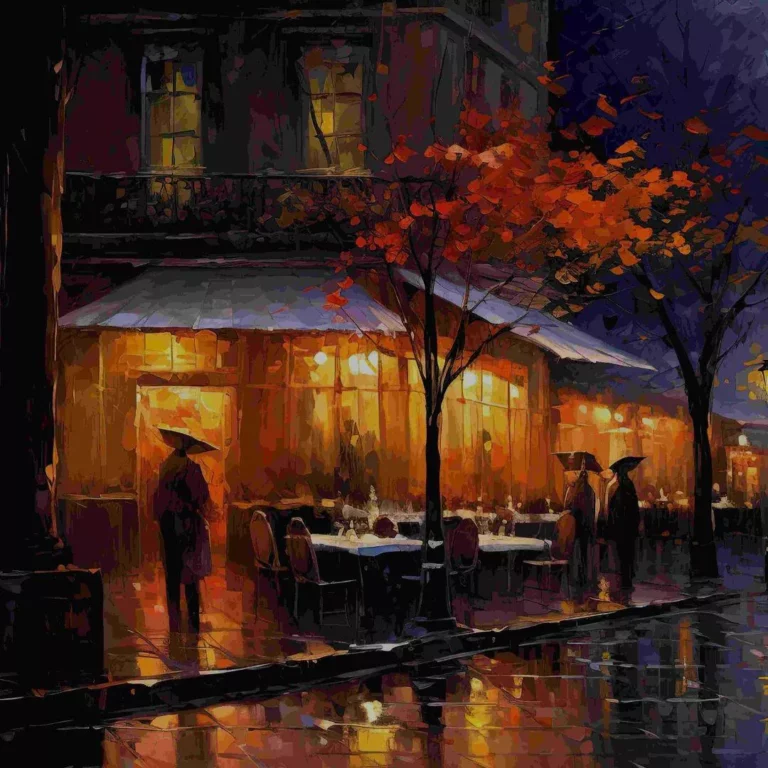
Memory-City, Living-Memory
Justin wasn't born in Paris, but he feels right at home here. Blame it on the memories he's created there, perhaps?

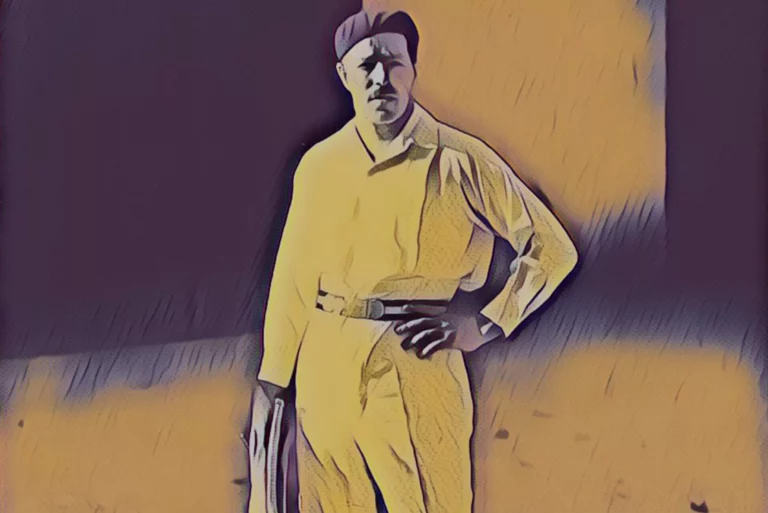
Jai Alai:The Joyful Game
Nicolas, proud of his Basque heritage, explores his identity quest through rock, meals at his abuela's, and political analysis.


